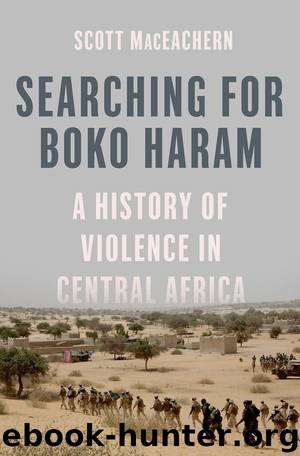Searching for Boko Haram by Scott MacEachern

Author:Scott MacEachern
Language: eng
Format: epub
Publisher: Oxford University Press
Published: 2017-01-15T00:00:00+00:00
Figure 5.2: Map of British and German boundaries south of Lake Chad, 1896
When the European powers actually entered the area and took up control after 1900, their jockeying for position and attempts to find local allies led to some adjustment in those borders. (As an Atlantic Canadian, I appreciate the fact that, in the signing of the Entente Cordiale between Great Britain and France in 1904, some minor adjustments of Lake Chad Basin borders in France’s favor were compensated by France giving up fishing rights around Newfoundland. Such were the days of global empire.) The negotiations between Britain and Germany on the frontier between their colonies lopped off the eastern tributary zone of Borno, as constituted in precolonial times, and made it part of German Kamerun, while Borno’s heartland was incorporated within Nigeria. This again left Melgwa territory poised along the border between the two colonial powers, roughly between Maiduguri, Dikwa, and Keroua, and that situation would continue as those borders became permanent, into the postcolonial period and to the present day.
In essence, then, Melgwa really have been border populations for centuries, marginal to states in both a spatial and a political sense. They have lived variably in the tributary and predation zones of those states, at different times making alliances and waging war according to the demands on the situation. It is there as well that we see the continuing association of Melgwa communities not merely with borders but with border violence. In chapter 4, we examined the roles of states along their frontiers, particularly with the deep involvement of state violence in the expansion and sustainment of large-scale slave trades. Slave-raiding and trading were potential sources of wealth, both for state elites in capitals and for ruthless and determined people living on state borders. Some of the latter would have been people like Hamman Yaji, who held a recognized place in the administrative apparatus of larger states—in his case, both the Fulani jihadist state of Adamawa and the different colonial powers who successively claimed to control the area around Madagali.
However, many of the peoples living in these frontier regions were not state officials and were never fully assimilated within the control of centralized states. Some were people like the Melgwa. Because of their marginal status, in every sense of the word, and their lack of incorporation into states, the activities of Melgwa and people like them would not be described in the language of diplomacy by writers in state courts and capitals. Rather, they would be called robbers and bandits, as the Melgwa were from ibn Fartuwa onward. Through the nineteenth and early twentieth century, Melgwa communities were widely known as centers of banditry, in the area between Maiduguri and approximately the modern Cameroon-Nigeria border. This involved both raids on Hausa and Kanuri merchants moving between the markets of the region and robbery of Shuwa Arab cattle pastoralists, whose herds represented a great deal of wealth on the hoof (Tijani 2010, 48, 89–90). As we will see below,
Download
This site does not store any files on its server. We only index and link to content provided by other sites. Please contact the content providers to delete copyright contents if any and email us, we'll remove relevant links or contents immediately.
| Africa | Americas |
| Arctic & Antarctica | Asia |
| Australia & Oceania | Europe |
| Middle East | Russia |
| United States | World |
| Ancient Civilizations | Military |
| Historical Study & Educational Resources |
Goodbye Paradise(3810)
Men at Arms by Terry Pratchett(2838)
Tobruk by Peter Fitzsimons(2518)
Borders by unknow(2315)
Arabs by Eugene Rogan(2299)
Pirate Alley by Terry McKnight(2221)
More Than Words (Sweet Lady Kisses) by Helen West(1867)
Belonging by Unknown(1857)
It's Our Turn to Eat by Michela Wrong(1731)
The Biafra Story by Frederick Forsyth(1656)
The Source by James A. Michener(1613)
Botswana--Culture Smart! by Michael Main(1602)
Coffee: From Bean to Barista by Robert W. Thurston(1545)
A Winter in Arabia by Freya Stark(1538)
Gandhi by Ramachandra Guha(1532)
The Falls by Unknown(1527)
Livingstone by Tim Jeal(1489)
The Shield and The Sword by Ernle Bradford(1409)
Africa: Altered States, Ordinary Miracles by Richard Dowden(1384)
